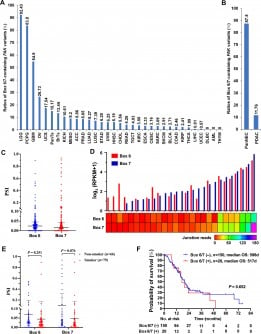Health
Researchers Identify Key Genetic Variants in Neuroendocrine Tumors

Researchers from the Chinese Academy of Medical Sciences and Peking Union Medical College have published a significant study identifying a high frequency of alternative splicing variants in the oncogene Focal Adhesion Kinase (FAK) within neuroendocrine tumors (NENs) of the pancreas and breast. The study, titled “High Frequency of Alternative Splicing Variants of the Oncogene Focal Adhesion Kinase in Neuroendocrine Tumors of the Pancreas and Breast,” appears in the latest issue of Frontiers of Medicine.
Neuroendocrine neoplasms are a diverse group of tumors that arise in various organs, yet their characteristic genetic abnormalities have not been fully understood. The research team analyzed data from The Cancer Genome Atlas, which includes information from 9,193 patients across 33 cancer subtypes. Their findings reveal that variants containing Box 6/Box 7 of FAK (referred to as FAK 6/7) were present in an impressive 87.5% of pancreatic neuroendocrine carcinomas (7 out of 8 cases) and 11.76% of pancreatic ductal adenocarcinomas (20 out of 170 cases).
To further validate their findings, the researchers examined 157 tumor samples collected from Chinese patients diagnosed with pancreatic tumors. The analysis showed that FAK 6/7 was positive in 75.6% of pancreatic NENs (34 out of 45), 47.5% of pancreatic solid pseudopapillary neoplasms (19 out of 40), and 2.9% of pancreatic ductal adenocarcinomas (2 out of 69).
Significant Findings in Breast Neuroendocrine Carcinomas
The study also explored the presence of FAK splicing variants in breast neuroendocrine carcinomas (BrNECs). Remarkably, FAK 6/7 was detected in 93.3% of BrNECs (14 out of 15), while no instances were found in 23 non-neuroendocrine breast cancers. This stark contrast underscores the potential of FAK 6/7 as a distinguishing biomarker for these types of tumors.
The researchers investigated the mechanisms behind the formation of FAK 6/7 and identified an overexpression of the splicing factor serine/arginine repetitive matrix protein 4 (SRRM4) in FAK 6/7-positive pancreatic and breast tumors. This overexpression appears to facilitate the development of these specific FAK variants within the cancer cells.
The implications of these findings are substantial. The identification of FAK 6/7 as a potential biomarker for neuroendocrine tumors could lead to new diagnostic and therapeutic strategies for these often-overlooked diseases.
This study received support from several significant funding programs, including the Key Project of the National Natural Science Foundation of China, the National Key Research and Development Program of China, and the CAMS Innovation Fund for Medical Sciences among others.
For those interested in further details, the full research paper is available at: Frontiers of Medicine.
This groundbreaking research enhances the understanding of genetic alterations in neuroendocrine tumors and opens avenues for targeted treatment options, offering hope for patients affected by these challenging malignancies.
-

 Lifestyle3 months ago
Lifestyle3 months agoLibraries Challenge Rising E-Book Costs Amid Growing Demand
-

 Sports3 months ago
Sports3 months agoTyreek Hill Responds to Tua Tagovailoa’s Comments on Team Dynamics
-

 Sports3 months ago
Sports3 months agoLiverpool Secures Agreement to Sign Young Striker Will Wright
-

 Lifestyle3 months ago
Lifestyle3 months agoSave Your Split Tomatoes: Expert Tips for Gardeners
-

 Lifestyle3 months ago
Lifestyle3 months agoPrincess Beatrice’s Daughter Athena Joins Siblings at London Parade
-

 World3 months ago
World3 months agoWinter Storms Lash New South Wales with Snow, Flood Risks
-

 Science3 months ago
Science3 months agoTrump Administration Moves to Repeal Key Climate Regulation
-

 Science2 months ago
Science2 months agoSan Francisco Hosts Unique Contest to Identify “Performative Males”
-

 Business3 months ago
Business3 months agoSoFi Technologies Shares Slip 2% Following Insider Stock Sale
-

 Science3 months ago
Science3 months agoNew Tool Reveals Link Between Horse Coat Condition and Parasites
-

 Sports3 months ago
Sports3 months agoElon Musk Sculpture Travels From Utah to Yosemite National Park
-

 Science3 months ago
Science3 months agoNew Study Confirms Humans Transported Stonehenge Bluestones









